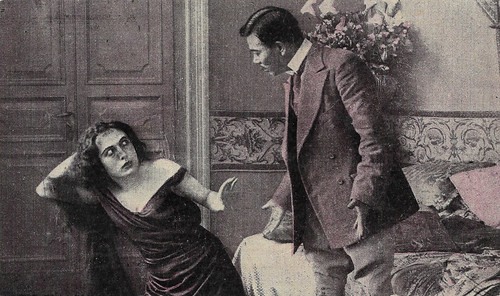In the Chocolate Amattler series, EFSP presents another Italian silent film, Malìa (Alfredo De Antoni, 1917), produced by Caesar Film. The Spanish title for this film was Liliana and Liliana was played by majestic diva Francesca Bertini (1892-1985). The portrait photos were made by Pinto in Rome.

Spanish collectors card by Chocolate Amattler, Marca Luna, series 4, no. 3. Photo: Pinto, Rome / Caesar Film. Francesca Bertini in Malìa (Alfredo De Antoni, 1917).

Spanish collectors card by Chocolate Amattler, Marca Luna, series 4, no. 8. Photo: Caesar Film. Tamoshiro Matsumoto and Francesca Bertini in Malìa (Alfredo De Antoni, 1917).
The famous dancer Liliana di Sant'Elmo (Francesca Bertini) has married count Carlo De Rienzo (Lido Manetti), a sensible and good man, but addicted to the vice of gambling. In order to pay back a gambling debt, he borrows a large sum from an evil marquis, Osaka Yamagoto (Tamoshiro Matsumoto).
While courting Carlo's wife, the marquis is willing to cancel the debt. But Liliana, who is faithful to her husband and willing to give the ultimate sacrifice, manages to break down the blackmail by killing the perfidious Oriental.
Malìa premiered in Rome on 6 December 1917. It was a quite shameless rip-off of Cecil B. DeMille's The Cheat, known in Italy under its French title as Forfaiture. As the film does not survive, we cannot check in detail, and some details above don't occur in The Cheat, but the Spanish postcards indicate there must be a same scene of the branding of the woman, indicating she is now a possession of Yamagoto, just like his art works.
There is a similar court case, in which the woman is probably acquitted after telling her tragic account, though as critic Pier da Costello deplored in 'La vita cinematografica', the use of the mob in this scene lacks. In general Da Costello thought the film had superior sets and Bertini wore superior costumes, compared to Fanny Ward's in The Cheat, but Da Castello condemned the acting and direction, and most of all the script.
As the film came out in Italy before the Italian release of the Cheat, other critics initially praised the film, but after Da Costello also other critics condemned Bertini's performance as too cold, and the plot lacking originality. This did not stop audiences from flocking to the cinemas, to see their diva, her sufferings, and her luxurious toilettes and surroundings.

Spanish collectors card by Chocolate Amattler, Marca Luna, series 4, no. 16. Photo: Caesar Film. Francesca Bertini and Tamoshiro Matsumoto in Malìa (Alfredo De Antoni, 1917).

Spanish collectors card by Chocolate Amattler, Marca Luna, series 4, no. 17. Photo: Caesar Film. Francesca Bertini in Malìa (Alfredo De Antoni, 1917).
Source: Vittorio Martinelli (Il cinema muto italiano - 1917), Wikipedia (Italian), and IMDb.

Spanish collectors card by Chocolate Amattler, Marca Luna, series 4, no. 3. Photo: Pinto, Rome / Caesar Film. Francesca Bertini in Malìa (Alfredo De Antoni, 1917).

Spanish collectors card by Chocolate Amattler, Marca Luna, series 4, no. 8. Photo: Caesar Film. Tamoshiro Matsumoto and Francesca Bertini in Malìa (Alfredo De Antoni, 1917).
A quite shameless rip-off of The Cheat
The famous dancer Liliana di Sant'Elmo (Francesca Bertini) has married count Carlo De Rienzo (Lido Manetti), a sensible and good man, but addicted to the vice of gambling. In order to pay back a gambling debt, he borrows a large sum from an evil marquis, Osaka Yamagoto (Tamoshiro Matsumoto).
While courting Carlo's wife, the marquis is willing to cancel the debt. But Liliana, who is faithful to her husband and willing to give the ultimate sacrifice, manages to break down the blackmail by killing the perfidious Oriental.
Malìa premiered in Rome on 6 December 1917. It was a quite shameless rip-off of Cecil B. DeMille's The Cheat, known in Italy under its French title as Forfaiture. As the film does not survive, we cannot check in detail, and some details above don't occur in The Cheat, but the Spanish postcards indicate there must be a same scene of the branding of the woman, indicating she is now a possession of Yamagoto, just like his art works.
There is a similar court case, in which the woman is probably acquitted after telling her tragic account, though as critic Pier da Costello deplored in 'La vita cinematografica', the use of the mob in this scene lacks. In general Da Costello thought the film had superior sets and Bertini wore superior costumes, compared to Fanny Ward's in The Cheat, but Da Castello condemned the acting and direction, and most of all the script.
As the film came out in Italy before the Italian release of the Cheat, other critics initially praised the film, but after Da Costello also other critics condemned Bertini's performance as too cold, and the plot lacking originality. This did not stop audiences from flocking to the cinemas, to see their diva, her sufferings, and her luxurious toilettes and surroundings.

Spanish collectors card by Chocolate Amattler, Marca Luna, series 4, no. 16. Photo: Caesar Film. Francesca Bertini and Tamoshiro Matsumoto in Malìa (Alfredo De Antoni, 1917).

Spanish collectors card by Chocolate Amattler, Marca Luna, series 4, no. 17. Photo: Caesar Film. Francesca Bertini in Malìa (Alfredo De Antoni, 1917).
Source: Vittorio Martinelli (Il cinema muto italiano - 1917), Wikipedia (Italian), and IMDb.
No comments:
Post a Comment